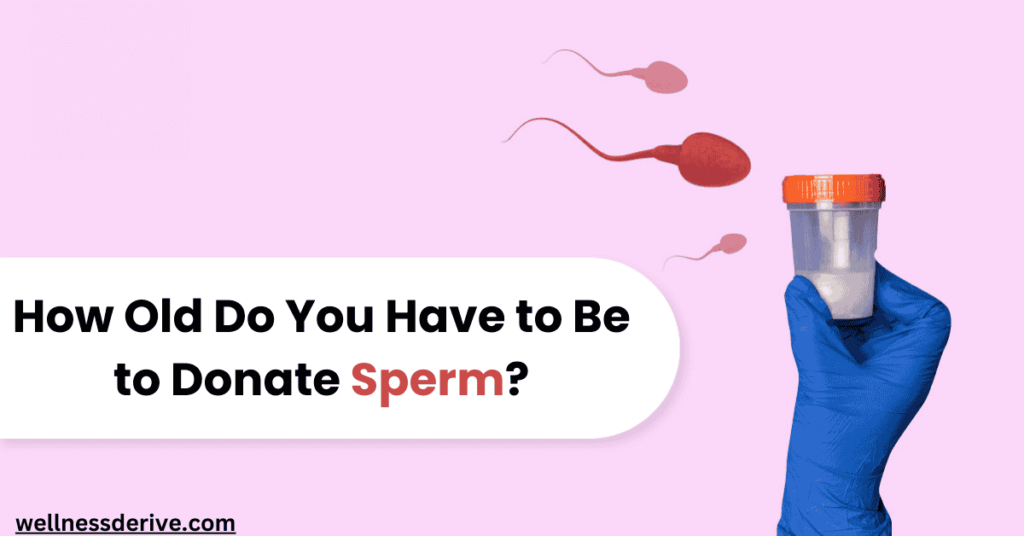Sperm donation provides a unique opportunity to help families in need of reproductive assistance. But not everyone is eligible to donate sperm—there are specific requirements, including age, that donors must meet. So, how old do you have to be to donate sperm? In this article, we’ll explore the age requirements, general qualifications, and guidelines for becoming a sperm donor.
Age Requirements for Sperm Donation
Most sperm banks set a minimum age requirement for donors, generally between 18 and 39 years old. This age range ensures that donors are physically mature and healthy, maximizing the quality of each donation.
- Minimum Age: Donors must be at least 18 years old. This is to ensure the donor has reached legal adulthood and is mature enough to understand the responsibilities of sperm donation.
- Maximum Age: Most sperm banks set an upper age limit, typically 39 years old, as sperm quality can decline with age.
Why Is There an Age Limit for Sperm Donation?
Age limits exist to ensure the health and quality of the sperm. Research indicates that sperm quality—such as count, motility, and morphology—may decline with age, which can impact fertility. Here’s why the age restriction is crucial:
1. Higher Quality of Sperm:
Younger donors generally produce higher-quality sperm, which is crucial for successful fertilization.
2. Genetic Health and Safety:
Donors within the 18–39 age range are less likely to have genetic mutations or age-related health issues that could affect the recipient’s future child.
3. Legal and Psychological Maturity:
Sperm donation involves consent, and candidates should be mature enough to understand the ethical and psychological implications.
General Requirements to Donate Sperm
In addition to the age limit, sperm donors must meet various other criteria, which differ by sperm bank. Here are the common requirements for becoming a sperm donor:
- Physical Health
A physical examination and health screening are required to ensure the donor has no genetic or infectious diseases. - Mental Health
Many sperm banks conduct psychological evaluations to confirm the donor is mentally prepared for the responsibilities involved. - Genetic Screening
To prevent genetic diseases, donors must undergo genetic testing, especially if there’s a family history of genetic disorders.
Height and Other Physical Requirements
While age is a primary factor, some sperm banks have additional physical requirements for sperm donors.
- Height Requirements:
Some sperm banks prefer donors above a certain height, typically 5’10” or taller. This criterion is based on recipient preferences rather than medical necessity. - Lifestyle and Health Habits:
Non-smoking and healthy lifestyle habits are generally required, as these impact sperm quality. Banks often look for donors who do not use drugs or excessive alcohol.
What Are the Qualifications to Be a Sperm Donor?
The qualifications to be a sperm donor vary, but generally, sperm banks look for the following attributes:
- Education and Background
Many facilities prefer donors with higher education or specific backgrounds that are in demand among recipients. - Commitment
Most sperm banks require a commitment period, often six months to a year, as samples undergo quality testing before they’re used. - No Genetic Disorders
Family history free of genetic disorders is a common requirement to reduce the risk of passing on health issues.
How to Become a Sperm Donor: The Process
If you meet the requirements and age criteria, the next step is to go through the application and screening process. Here’s what to expect:
- Application
Fill out an application that includes your background, education, and medical history. - Initial Screening and Interviews
Sperm banks conduct initial screenings and interviews to assess your qualifications and ensure you’re a suitable candidate. - Medical and Genetic Testing
Donors undergo physical exams, blood tests, and genetic screening. The purpose is to rule out any infectious diseases or genetic risks. - Trial Donation
Some facilities require a trial donation to assess the sperm quality. If approved, you may be invited for regular donations.
Rules and Regulations for Sperm Donation
Each country and sperm bank may have specific rules and regulations. In the U.S., for example, the American Society for Reproductive Medicine sets guidelines on the maximum number of families a single donor’s sperm can help create, often around 25 families per geographic area. This helps prevent accidental familial connections within a region.
Tips for Meeting Sperm Donor Requirements
To increase your chances of qualifying, here are a few tips:
- Maintain a Healthy Lifestyle
Healthy diet, regular exercise, and avoiding tobacco or drug use can enhance sperm quality. - Understand the Commitment
Sperm donation often requires multiple visits and consistent sample quality over time, so be prepared for this commitment. - Stay Informed of Medical History
Knowing your family’s medical history can help answer screening questions and prevent potential disqualifications.
FAQS About Sperm Donor Age and Requirements
Can You Donate Sperm at 16?
No, most sperm banks require donors to be at least 18 years old due to legal and health-related reasons.
Is There a Height Requirement to Donate Sperm?
Yes, some sperm banks have a minimum height requirement, although this is not universal.
What Disqualifies You from Being a Sperm Donor?
Factors like certain genetic disorders, smoking, or drug use can disqualify potential donors. Additionally, a lack of commitment or family medical history with genetic diseases may also disqualify a candidate.
How Much Can You Make as a Sperm Donor?
Sperm donors can earn between $50 and $200 per donation, depending on the location and sperm bank policies.
Is There an Age Limit for Donating Sperm Internationally?
While age limits in the U.S. range from 18 to 39, international guidelines vary. In some countries, sperm banks may set higher or lower age caps based on local regulations and population needs.
Requirements to Donate Sperm in Different States
Different states in the U.S. may have specific guidelines or restrictions for sperm donors. Some states may have unique screening requirements, while others follow general national guidelines.
Conclusion
Sperm donation offers an opportunity to make a difference for families in need, but it’s essential to meet the specific requirements set by sperm banks. The age requirement—usually 18 to 39—ensures donors are in their prime reproductive years, contributing to high-quality donations. Additionally, health, genetic history, and lifestyle factors play a role in determining eligibility.
If you’re considering becoming a sperm donor, understanding these guidelines can help you decide if you meet the criteria. By maintaining a healthy lifestyle and staying informed of the qualifications, you can improve your chances of qualifying and potentially earn while helping others build their families.
Disclaimer: The content on Wellness Derive is for informational purposes only and not a substitute for professional medical advice, diagnosis, or treatment. Always consult a healthcare provider for medical concerns.



